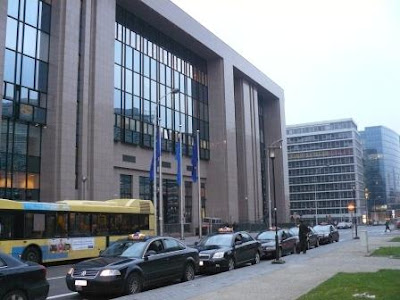In the wake of the last EU summit, all leaders who had entered lengthy negociations in Brussels claimed ‘victory’, whilst not truly achieving anything substantial for the half a billion European citizens.
On the one hand, the presumed Franco-German diktat of a European Fiscal Union stepped closer to reality than ever before.
By March 2012, another EU Treaty with as strong historical implications as those of the Treaty of Maastricht is due to be signed.
Out of the EU’s current 27 members (soon to be 28), at least 23 countries will no longer decide exclusively by themselves how to shape their national budgets. A Big – and pressumably wiser – Brother in Brussels (the European Commission) would ‘help’ national governments plan their spending more carefully.
That should be cheered as a ‘triumph’ of common sense and seen as a ‘safeguard’ that public debt would stop accumulating to unsustainable levels in EU countries, we were told.
Nevertheless, this assumption regarding the smooth functioning of the future United States of Europe (USE) does absolutely nothing to solve the actual economic crisis in Europe, and the future of the common currency is still uncertain.
Irrespective of the ideological debate – is it worth giving up national sovereignty or not, could Europeans live better within the USE than in their national states? – a full fiscal union offers no solutions to the current debt crisis…
Neither to the lack of competitivity of many European economic sectors or to the demographic and moral decline of the Old Continent.
When and who is ever going to address those issues in the EU? For how long would political leaders be fooled by fictions such as ‘economic growth’ and ‘prosperity’, which are impossible to achieve while built up on other fictions such as ‘credit’ and ‘capital markets’?
When will history makers (politicians) learn the bitter lessons of history that all times of severe crisis are the broader consequence of a grave moral ills rather than effects of mere disfunctionalities or redeemable mistakes?
There cannot be growth on a continent where millions of EU nationals are are still ‘second (or even fourth!) class citizens’ on the job market, where the brain drain to the USA has never ceased, where hedonism, promiscuity, moral relativism and abortions are widespread.
On the other hand, Britain’s PM David Cameron also claimed his petty ‘victory’ for managing to snatch his country out of the future new European treaty.
Far be it from me to join those deploring Great Britain’s self-condemnation to many years (the most commmonly invoked figure is 20) of isolation. After all, outside the European Exchange Mechanism and the Eurozone, Britain had done better than it would have probably done inside.
Anyway, the much esteemed financial services and the partly nationalised British banking system will not remain immune to what’s going on in the Eurozone, and their freedom of maneuver could be limited whether the UK is in or out a new EU treaty.
Cameron put himself in a ridiculous position, as defender of the bankers (and not for the first time!) in an era when everyone hates them, although most EU Council solutions to the crisis favoured this clique, not the European taxpayers.
In spite of being portrayed as an isolationist (in Europe) or foolish (at home), he dared taking a huge gamble, and that’s somewhat admirable.
Especially when compared to yesmen like Romania’s President Traian Băsescu, who has been a brainwashed lobbyist for the USE even long before this last EU summit.
Last, the little victories of the Hungarian, Swedish and Czech delegations who said they would first consult national parliaments are also ridiculous. It’s not impossible but very unlikely that they would join Britain on the isolationist path.
Britain and Sweden could possibly afford it, like Switzerland and Norway. But Hungary and the Czech Republic would eventually give in to unbearable pressures.
All the triumphalism of those pretending to avoid a catastrophy either by wowing for deeper European integration or, on the contrary, by staying out of too much integration – is equally meaningless.
Europe is in desperate need of both sound economic solutions and of reshaped moral foundations, which it gravely lacks.
Their absence is by no means a sign that the Old Continent requires a ‘revolution’ in political terms or a sort of ‘Nuremberg trial’ for a failed generation of bankers and/or politicians.
It would actually need other Europeans – people aspiring towards what truly matters in this life (which is but an antechamber of afterlife), not hordes of hedonist copycats, enslaved by the dreadful illusion that happiness equals a perpetual ‘I-do-what-I-please (having fun, feeling good) here and now’...
Simply replacing a wrong ideological model (unrestricted free flow of capital, living on credit) with another (a centralisation of austerity) leaves little room for hope. Everything will keep turning from bad to worse.
[For all the posts on this blog go to/Pentru toate postările de pe acest blog mergi la: Contents/Cuprins]










1 comment:
Photo Legend:
[1] A ‘work of art’ exhibited at the Europalia Festival (Brussels, October 3, 2007 – February 3, 2008) – the intended metaphor probably had to do with EU leaders sitting together during European Councils, European unity, equality between Member States, democracy etc… Anyway, that was in pre-crisis EU, thus the image may suggest other things these days :-)
[2] The Justus Lipsius building in Brussels, serving as headquarters of the Council of the EU since 1995.
[3] The Berlaymont building in Brussels, housing the bulk of the European Commission personnel as of 1969.
Post a Comment